#paradise lost john milton
Text


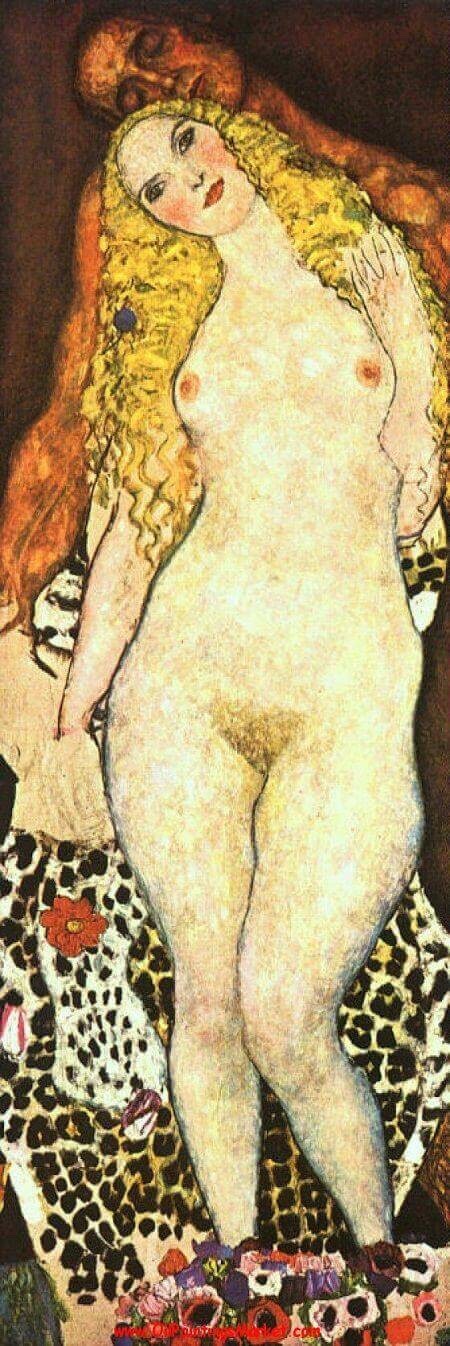
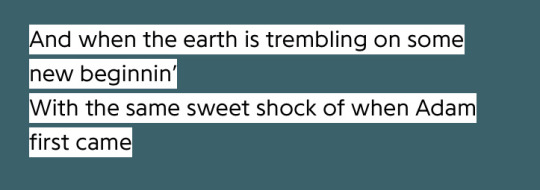
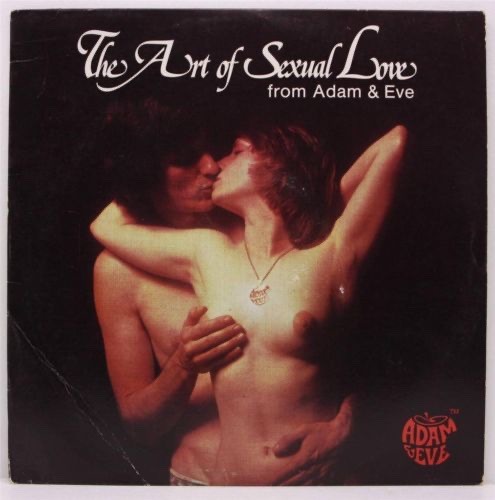

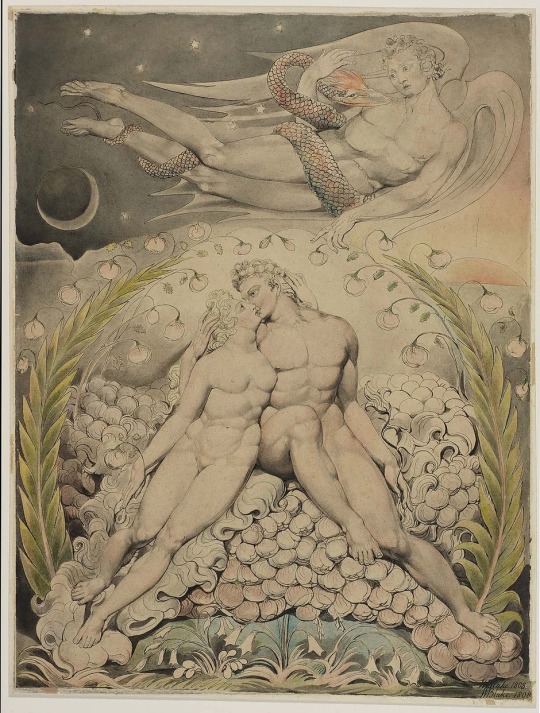



Genesis 1:28 "And God said to them Be Fruitful..."
frank ocean / david teniers the younger's adam and eve (1650) / gustav klimt's adam and eve (1917) / hozier / the art of sexual love from adam & eve company vinyl cover art (1977) / nina simone and oscar brown jr. / william blake's satan watching the caresses of adam and eve (1808) / paradise lost by john milton / salvador viniegra's the first kiss of adam and eve (1891) / deviantart comment from user sgtsigma
#web weaving#adam and eve#love#religion#forbidden fruit#desire#frank ocean#hozier#paradise lost#nina simone#oscar brown jr#gustav klimt#david teniers#william blake#john milton#paradise lost john milton#salvador viniegra#tell me how my nature feels 😳#okay this was born because i'm a frank ocean mega fan in a hozier lockdown and yeah. i connected the dots!#tumblr PLEASE don't be a meanie about this it's art! ART#xochitl talks
18 notes
·
View notes
Text
Ah yes, my favourite Bible fanfics, in no particular order
"Paradise Lost", John Milton
"Divine Comedy", Dante Alighieri
"Good Omens", Terry Pratchett and Neil Gaiman
#fanfiction#fanfic#fanfic recommendation#Bible#go#good omens#neil gaiman#terry pratchett#divine comedy#dante alighieri#paradise lost#john milton
3K notes
·
View notes
Text
"I think Homer outwits most writers who have written on the War [fantasy archetype], by not taking sides.
The Trojan war is not and you cannot make it be the War of Good vs. Evil. It’s just a war, a wasteful, useless, needless, stupid, protracted, cruel mess full of individual acts of courage, cowardice, nobility, betrayal, limb-hacking-off, and disembowelment. Homer was a Greek and might have been partial to the Greek side, but he had a sense of justice or balance that seems characteristically Greek — maybe his people learned a good deal of it from him? His impartiality is far from dispassionate; the story is a torrent of passionate actions, generous, despicable, magnificent, trivial. But it is unprejudiced. It isn’t Satan vs. Angels. It isn’t Holy Warriors vs. Infidels. It isn’t hobbits vs. orcs. It’s just people vs. people.
Of course you can take sides, and almost everybody does. I try not to, but it’s no use; I just like the Trojans better than the Greeks. But Homer truly doesn’t take sides, and so he permits the story to be tragic. By tragedy, mind and soul are grieved, enlarged, and exalted.
Whether war itself can rise to tragedy, can enlarge and exalt the soul, I leave to those who have been more immediately part of a war than I have. I think some believe that it can, and might say that the opportunity for heroism and tragedy justifies war. I don’t know; all I know is what a poem about a war can do. In any case, war is something human beings do and show no signs of stopping doing, and so it may be less important to condemn it or to justify it than to be able to perceive it as tragic.
But once you take sides, you have lost that ability.
Is it our dominant religion that makes us want war to be between the good guys and the bad guys?
In the War of Good vs. Evil there can be divine or supernal justice but not human tragedy. It is by definition, technically, comic (as in The Divine Comedy): the good guys win. It has a happy ending. If the bad guys beat the good guys, unhappy ending, that’s mere reversal, flip side of the same coin. The author is not impartial. Dystopia is not tragedy.
Milton, a Christian, had to take sides, and couldn’t avoid comedy. He could approach tragedy only by making Evil, in the person of Lucifer, grand, heroic, and even sympathetic — which is faking it. He faked it very well.
Maybe it’s not only Christian habits of thought but the difficulty we all have in growing up that makes us insist justice must favor the good.
After all, 'Let the best man win' doesn’t mean the good man will win. It means, 'This will be a fair fight, no prejudice, no interference — so the best fighter will win it.' If the treacherous bully fairly defeats the nice guy, the treacherous bully is declared champion. This is justice. But it’s the kind of justice that children can’t bear. They rage against it. It’s not fair!
But if children never learn to bear it, they can’t go on to learn that a victory or a defeat in battle, or in any competition other than a purely moral one (whatever that might be), has nothing to do with who is morally better.
Might does not make right — right?
Therefore right does not make might. Right?
But we want it to. 'My strength is as the strength of ten because my heart is pure.'
If we insist that in the real world the ultimate victor must be the good guy, we’ve sacrificed right to might. (That’s what History does after most wars, when it applauds the victors for their superior virtue as well as their superior firepower.) If we falsify the terms of the competition, handicapping it, so that the good guys may lose the battle but always win the war, we’ve left the real world, we’re in fantasy land — wishful thinking country.
Homer didn’t do wishful thinking.
Homer’s Achilles is a disobedient officer, a sulky, self-pitying teenager who gets his nose out of joint and won’t fight for his own side. A sign that Achilles might grow up someday, if given time, is his love for his friend Patroclus. But his big snit is over a girl he was given to rape but has to give back to his superior officer, which to me rather dims the love story. To me Achilles is not a good guy. But he is a good warrior, a great fighter — even better than the Trojan prime warrior, Hector. Hector is a good guy on any terms — kind husband, kind father, responsible on all counts — a mensch. But right does not make might. Achilles kills him.
The famous Helen plays a quite small part in The Iliad. Because I know that she’ll come through the whole war with not a hair in her blond blow-dry out of place, I see her as opportunistic, immoral, emotionally about as deep as a cookie sheet. But if I believed that the good guys win, that the reward goes to the virtuous, I’d have to see her as an innocent beauty wronged by Fate and saved by the Greeks.
And people do see her that way. Homer lets us each make our own Helen; and so she is immortal.
I don’t know if such nobility of mind (in the sense of the impartial 'noble' gases) is possible to a modern writer of fantasy. Since we have worked so hard to separate History from Fiction, our fantasies are dire warnings, or mere nightmares, or else they are wish fulfillments."
- Ursula K. Le Guin, from No Time to Spare, 2013.
#ursula k. le guin#homer#quote#quotations#the iliad#trojan war#storytelling#fantasy#fiction writing#war#conflict#tragedy#john milton#paradise lost#greek mythology
2K notes
·
View notes
Text
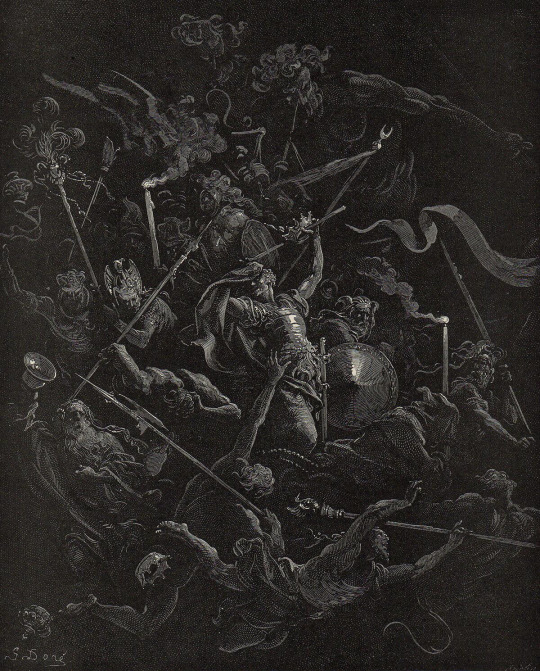
Chaos watches as the Rebel Angels are thrown into Hell (Milton's Paradise Lost)
by Gustave Doré
#gustave doré#art#paradise lost#john milton#chaos#fallen angel#fallen angels#war#battle#heaven#paradise#hell#lucifer#satan#angel#angels#demons#christianity#christian#religion#religious art#crown#sceptre#fall#fallen#rebellion#armour#shield#bible#biblical
1K notes
·
View notes
Photo

John Milton, Paradise Lost, Book 1
[originally published 1667]
#truer words were never spoken#john milton#literature#paradise lost#words#quotes#academia#dark academia#quote#lit#heaven#hell#books#books and libraries#reading#quote of the day#bookworm#book quotes#prose#booklr#bibliophile#excerpt
3K notes
·
View notes
Text

John Milton, from 'Paradise Lost'
1K notes
·
View notes
Text
Ok so we could:
Read Bible fanfic (Good omens)
Read Bible fanfic (Paradise Lost)
Read Bible fanfic (The Locked Tomb)
Read Bible fanfic (Inferno)
Or:
Watch Bible fanfic (Supernatural)
Watch Bible fanfic (Hazbin Hotel/Helluva Boss)
Watch Bible fanfic (Good Omens)
Your choice!
#throws this into the abyss#I have such broad taste#and I’m totally normal about it#and cannibalism#transubstantiation#good omens#good omens 2#anthony j crowley#the locked tomb#tlt#harrowhark nonagesimus#gideon nav#gideon the ninth#harrow the ninth#nona the ninth#paradise lost#john milton#helluva boss#hazbin hotel#supernatural#I’m so normal about the Christ/Lucifer figures in media#I’m so normal about this
301 notes
·
View notes
Text

#art#etching#paradise lost#illustration#book illustration#mezzotint#john milton#english literature#literature#pandemonium#john martin
430 notes
·
View notes
Photo
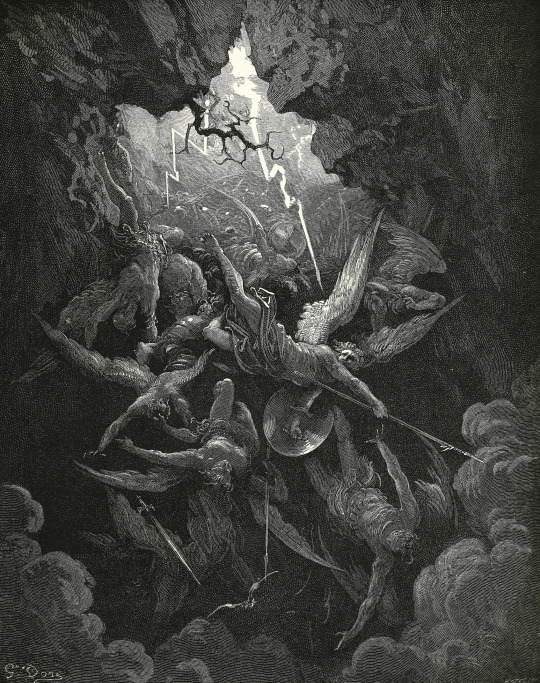
PARADISE LOST: “THE MOUTH OF HELL”
by GUSTAVE DORÉ | engraving, circa 1866
#gustave doré#gustave dore#romanticism#illustration#modern art#black and white#monochrome#engraving#paradise lost#john milton#19th century#french#art#u
6K notes
·
View notes
Text


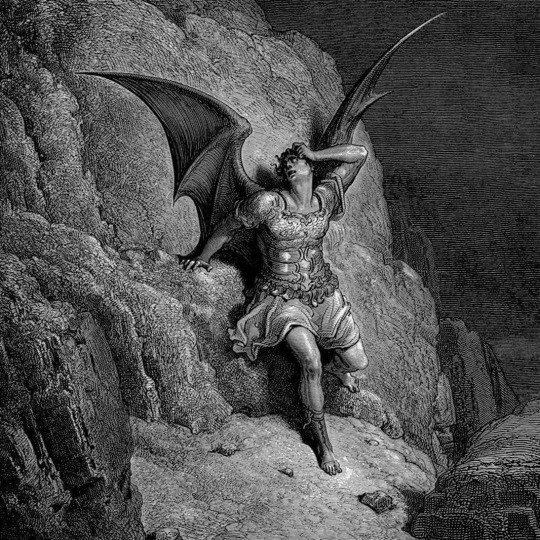

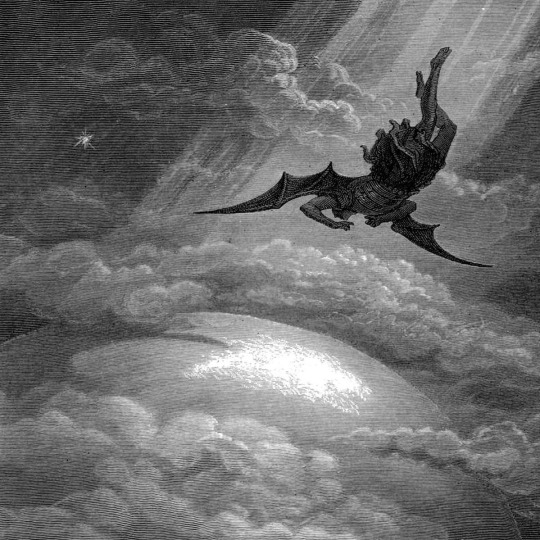
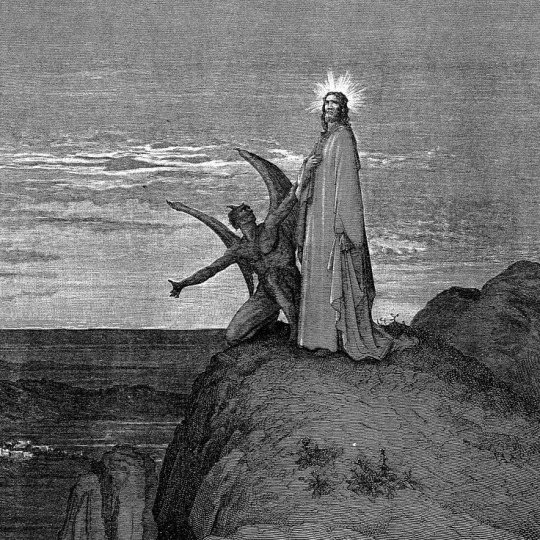

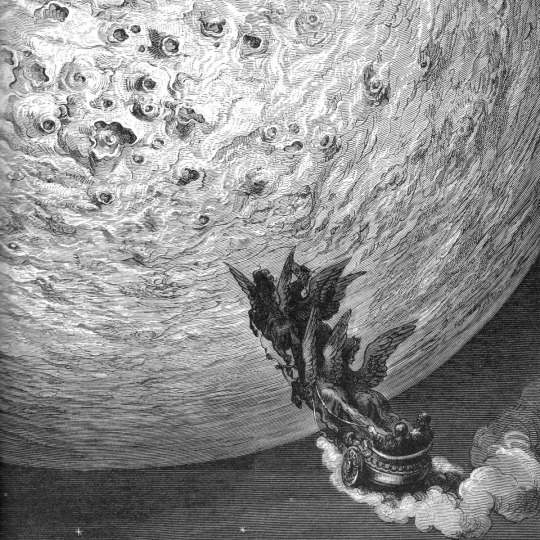

Artists: Gustave Doré (1832 - 1883)
#paradise lost#inferno#dante's inferno#the divine comedy#la commedia divina#the bible#classic literature#classic lit#john milton#genesis#dante alighieri#lucifer morningstar#black and white#art#fine art#french art#gustave doré#dark academia#dark academia aesthetic#angels#religious imagery#heaven and hell#artists#european art#catholic trauma
2K notes
·
View notes
Text
Paradise Lost: How John Milton's 1667 work influenced "Hazbin Hotel"
I've been thinking about why the "fruit of knowledge" in Hazbin Hotel is depicted as an apple, as opposed to another fruit that would've been more accurate to the Middle East during the Fall of Man, as well as how Paradise Lost by John Milton (1667) influenced the show.
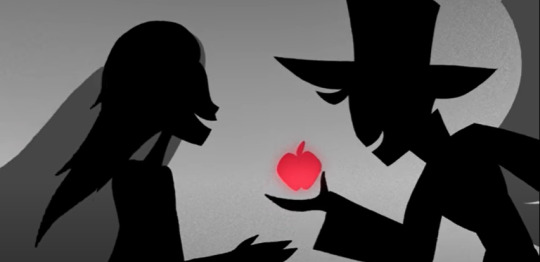
Per one source:
"Because the Hebrew Bible describes the forbidden fruit only as 'peri', the term for general fruit, no one knows [what exactly type of fruit it was]. It could be a fruit that doesn't exist anymore. Historians have speculated it may have been any one of these fruits: pomegranate, mango, fig, grapes, etrog or citron, carob, pear, quince, or mushroom."
Per Wikipedia:
"The pseudepigraphic Book of Enoch describes the tree of knowledge: 'It was like a species of the Tamarind tree, bearing fruit which resembled grapes extremely fine; and its fragrance extended to a considerable distance. I exclaimed, How beautiful is this tree, and how delightful is its appearance!' (1 Enoch 31:4)."
In Jewish and Islamic traditions, the "fruit of knowledge" is commonly identified with grapes. The Zohar explains that Noah attempted (but failed) to rectify the sin of Adam by using grape wine for holy purposes. Today, the "Noah grape" is still used to make white wine.

Furthermore:
"The association of the pomegranate with knowledge of the underworld as provided in the Ancient Greek legend of Hades and Persephone may also have given rise to an association with knowledge of the 'otherworld', tying-in with knowledge that is forbidden to mortals. It is also believed Hades offered Persephone a pomegranate to force her to stay with him in the underworld for 6 months of the year. Hades is the Greek god of the underworld, and the Bible states that whoever eats the forbidden fruit shall die."
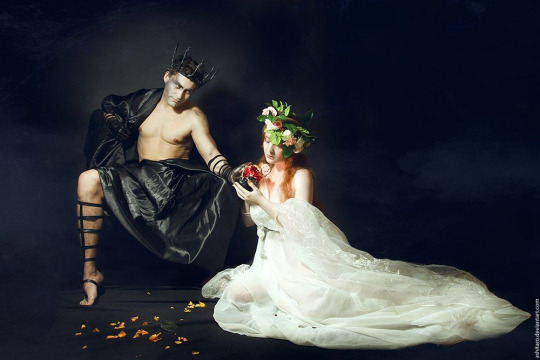
So, how then did the apple become the foremost symbol of the "fruit of knowledge"? You can partly thank Paradise Lost by English poet John Milton, a work which the lore of Hazbin Hotel is based off of.
Milton published the book in 1667, a time when the hedonistic Restoration era was in full swing. The exiled King Charles II was restored to the throne as King of England in 1660, and was a party animal, with dozens of mistresses, and nicknamed both the "playboy prince" and "Old Rowley", the latter after his favorite lustful stallion.
However, the association of the "fruit of knowledge" began with a Latin pun long before Milton immortalized the association in Paradise Lost. Per the linked article above by Nina Martyris for NPR:
"In order to explain, we have to go all the way back to the fourth century A.D., when Pope Damasus ordered his leading scholar of scripture, Jerome, to translate the Hebrew Bible into Latin. Jerome's path-breaking, 15-year project, which resulted in the canonical 'Vulgate', used the Latin spoken by the common man. As it turned out, the Latin words for evil and apple are the same: 'malus'.
[...] When Jerome was translating the 'Tree of the Knowledge of Good and Evil', the word 'malus' snaked in. A brilliant but controversial theologian, Jerome was known for his hot temper, but he obviously also had a rather cool sense of humor.
'Jerome had several options,' says Robert Appelbaum, a professor of English literature at Sweden's Uppsala University. 'But he hit upon the idea of translating 'peri' as 'malus', which in Latin has two very different meanings. As an adjective, 'malus' means 'bad' or 'evil'. As a noun it seems to mean an apple, in our own sense of the word, coming from the very common tree now known officially as the 'Malus pumila'. So Jerome came up with a very good pun.'
The story doesn't end there. 'To complicate things even more,' says Appelbaum, 'the word 'malus' in Jerome's time, and for a long time after, could refer to any fleshy seed-bearing fruit. A pear was a kind of 'malus'. So was the fig, the peach, and so forth.'
Which explains why Michelangelo's Sistine Chapel fresco features a serpent coiled around a fig tree. But the apple began to dominate Fall artworks in Europe after the German artist Albrecht Dürer's famous 1504 engraving depicted the First Couple counterpoised beside an apple tree. It became a template for future artists such as Lucas Cranach the Elder, whose luminous Adam and Eve painting is hung with apples that glow like rubies.
Milton, then, was only following cultural tradition. But he was a renowned Cambridge intellectual fluent in Latin, Greek and Hebrew, who served as secretary for foreign tongues to Oliver Cromwell during the Commonwealth. If anyone was aware of the 'malus' pun, it would be him, and yet he chose to run it with it. Why?
Appelbaum says that Milton's use of the term 'apple' was ambiguous. 'Even in Milton's time the word had two meanings: either what was our common apple, or, again, any fleshy seed-bearing fruit. Milton probably had in mind an ambiguously named object with a variety of connotations as well as denotations, most but not all of them associating the idea of the apple with a kind of innocence, though also with a kind of intoxication, since hard apple cider was a common English drink.'
It was only later readers of Milton, says Appelbaum, who thought of 'apple' as 'apple', and not any seed-bearing fruit. For them, the forbidden fruit became synonymous with the 'malus pumila'. As a widely read canonical work, 'Paradise Lost' was influential in cementing the role of apple in the Fall of Man story."
To tie this back into John Milton's relationship with King Charles II of England, as mentioned, Milton originally served Oliver Cromwell, Lord Protector of England, and the English Commonwealth, which was formed with the overthrow and execution of King Charles I on 30 January 1649, following the bloody English Civil War (1642 – 1651).
The King's two sons - the newly-christened King Charles II, the elder, and James, Duke of York (King James II), the younger - fled into exile on the European continent. However, with the death of Oliver Cromwell on 3 September 1658 came the 2-year-long dissolution of the English Commonwealth, and the restoration of the monarchy.
As for Milton himself, we can look to an article by Bill Potter.
Milton, born on 9 December 1608, was around 51-52 years old when King Charles II was restored to the throne. He attended Christ's Church, Cambridge in his youth, and mastered at least six languages, as well as history and philosophy; making him, perhaps, the most knowledgeable poet in history. He spent more than a year travelling across Europe, conversing with and learning from intellectuals, linguists, poets, and artists, including the famous Galileo Galilei.
However, Milton was a controversial figure of his time, being unafraid to criticize institutions of authority; arguing that "divorce was Biblical", for which he was routinely condemned; joining the Puritans; penning the Areopagitica, a treatise on liberty in favor of Parliament and the Roundhead rebels, during the reign of King Charles I, arguing that the King must be held accountable by the people; and agreed with and justified the murder of King Charles I, for which Parliament hired him in 1649 as a propagandist and correspondence secretary to foreign powers, on account of his fiery manifestos against "the man".
The collapse of the Commonwealth with the death of Oliver Cromwell in 1658 did not deter Milton from continued political writing against the monarchy and the new public sentiment that brought about its Restoration under King Charles II in 1660. On the contrary, Milton - now totally blind, having lost his eyesight by the age of 44 in 1652, a decade earlier - began writing Paradise Lost in 1661, and spent the next six years dictating the work to transcribers.
A supporter of regicide, Milton was also forced into exile himself, and faked his own death, as Charles refused to pardon - and sought to execute - any of those directly involved with his father's murder. Milton's friends held a mock funeral for Milton on 27 August 1660, just months after the coronation of King Charles II on 23 April 1660.
King Charles II commented that he "applauded his [Milton's] policy in escaping the punishment of death [execution for treason] by a reasonable show of dying", but insisted on a public spectacle nonetheless by having Milton's writings burned by the public hangman.
After eventually obtaining a general pardon from King Charles II, Milton was imprisoned, and released, likely due to political friends in high places. He died, aged 64, in 1674. His theological views were sometimes considered heterodox by the best Puritans, and his political views came close to getting him executed on several occasions. His poetry, however, has endured as some of the greatest works in the English language, especially Paradise Lost; much of his greatest work was written during his 22 years of complete blindness.
One of the main factors in King Charles II deciding to grant a pardon to Milton was, ironically, Paradise Lost. While originally written by Milton as a scathing criticism of King Charles II and the monarchy - depicting Lucifer Morningstar as a sympathetic rebel against God, with King Charles II claiming that is right to rule came from "divine ordainment" - Charles II enjoyed the work, and authorized its publication on 20 August 1667. We know this because a 1668 copy of Paradise Lost in royal bindings by Samuel Mearne, bound lovingly in a fine red leather made of goat skins tanned with sumac, and stamped in gold with the royal cypher of King Charles II, was found. The endpapers bore a watermark with the royal arms of Charles II.
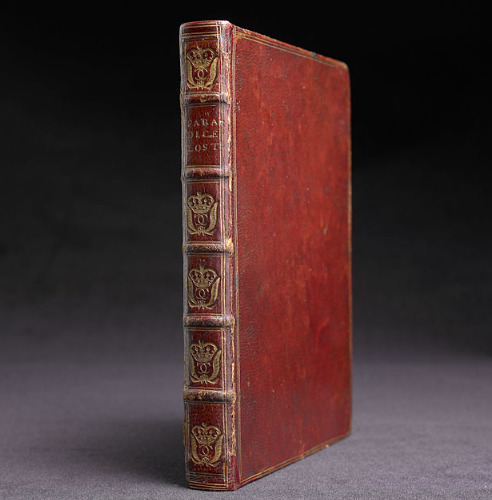
Per one Miltonian scholar: "The most single important event in Milton's life was the event against which he struggled most: the Restoration of Charles II, [and his relationship with the King]. Had it not come, we might have never had Paradise Lost...certainly, we should never have had [it] in [its] present power and significance."
Milton followed up Paradise Lost with Paradise Regained in 1671, three years before his death, with advice for King Charles II, urging the hedonistic Charles to "reign over himself and his passions":
"For therein stands the office of a King, His Honour, Vertue, Merit and chief Praise, That for the Publick all this weight he bears. Yet he who reigns within himself, and rules Passions, Desires, and Fears, is more a King; Which every wise and vertuous man attains: And who attains not, ill aspires to rule Cities of men, or head-strong Multitudes, Subject himself to Anarchy within, Or lawless passions in him which he serves." - John Milton, Paradise Regained, Book II, lines 463-472
To summarize: "If we must have a King back again, my Lord, please try to be a good man, unlike your father, who fell to his pride, [which was also the downfall of Lucifer]."
To quote another source: "Though the passage begins by noting that the office of a King is to bear the weight of public concerns, it is the control of one's private concerns that truly set a King apart as a virtuous character. Indeed, so important is self-command that any wise or virtuous man who attains it is like a king; any king who does not practice [self-command] is nothing more than a mere subject, ruled by anarchy and lawlessness."
Milton's words, too, echo a work written by Charles' grandfather, King James VI/I of Scotland and England: Basilikon Doron ("Royal Gift").
Per Wikipedia:
"'Basilikon Doron' (Βασιλικὸν Δῶρον) means 'royal gift' in Ancient Greek, and was written in the form of a private letter to James' eldest son, Henry, Duke of Rothesay (1594–1612). After Henry's death, James gave it to his second son, Charles, born 1600, later King Charles I. Seven copies were printed in Edinburgh in 1599, and it was republished in London in 1603, when it sold in the thousands.
This document is separated into three books, serving as general guidelines to follow to be an efficient monarch. The first describes a king's duty towards God as a Christian. The second focuses on the roles and responsibilities in office. The third concerns proper behaviour in daily life.
As the first part is concerned with being a good Christian, James instructed his son to love and respect God as well as to fear Him. Furthermore, it is essential to carefully study the Scripture (the Bible) and especially specific books in both the Old and New Testaments. Lastly, he must pray often and always be thankful for what God has given him.
In the second book, James encouraged his son to be a good king, as opposed to a tyrant, by establishing and executing laws as well as governing with justice and equality, such as by boosting the economy. The final portion of the Basilikon Doron focuses on the daily life of a monarch.
All of these guidelines composed an underlying code of conduct to be followed by all monarchs and heads of state to rule and govern efficiently. James assembled these directions as a result of his own experience and upbringing. He, therefore, offered the 'Basilikon Doron' ('Royal Gift') to his son, with the hope of rendering him a capable ruler, and perhaps to pass it down to future generations.
Overall, it repeats the argument for the divine right of kings, as set out in 'The True Law of Free Monarchies', which was also written by James. It warns against 'Papists' (Roman Catholics) and derides Puritans, in keeping with his philosophy of following a 'middle path', which is also reflected in the preface to the 1611 King James Bible. It also advocates removing the Apocrypha from the Bible."
King James VI/I further instructed his son and grandson:
"A good monarch must be well acquainted with his subjects, and so it would be wise to visit each of the kingdoms every three years."
"During war or armed conflict, he should choose old-but-good captains to lead an army of young and agile soldiers."
"In the court and the household, [a royal] should carefully select loyal gentlemen and servants to surround him. When the time came to choose a wife, it would be best if she were of the same religion and had a generous estate. However, she must not meddle with governmental politics, but perform her domestic duties."
"As for inheritance, to ensure stability, the kingdom should be left to the eldest son, not divided among all children."
"Lastly, it is most important...that [a royal] would know well his own craft...to properly govern over his subjects. To do so, [one] must study the laws of the kingdom, and actively participate in the council. Furthermore, [one] must be acquainted with mathematics for military purposes, and world history for foreign policy."
"[A royal] must also not drink and sleep excessively. His wardrobe should always be clean and proper, and he must never let his hair and nails grow long. In his writing and speech, he should use honest and plain language."
King James VI/I further supplemented Basilikon Doron with a written treatise titled The True Law of Free Monarchies: Or, The Reciprocal and Mutual Duty Between a Free King and His Natural Subjects.
"It is believed King James VI/I wrote the tract to set forth his idea of absolutist monarchism in clear contrast to the contractarian views espoused by, among others, James' tutor George Buchanan (in 'De Jure Regni apud Scotos'), [which] held the idea that monarchs rule in accordance of some sort of social contract with their people. James saw the divine right of kings as an extension of the apostolic succession, as both not being subjected by humanly laws."
Milton's own Areopagitica was a follow-up on De Jure Regni apid Scotos by George Buchanan, and also to The True Law of Free Monarchies, as well as the idea of the "divine right of kings". It takes its title in part from Areopagitikos (Greek: Ἀρεοπαγιτικός), a speech written by Athenian orator Isocrates in the 4th century BC.
Most importantly, Milton also wrote on the concept of free will: "Milton's ideas were ahead of his time in the sense that he anticipated the arguments of later advocates of freedom of the press by relating the concept of free will, and choice to individual expression and right."
The concept of free will, too, was a major topic explored in Paradise Lost. Per one source: "In 'Paradise Lost', Milton argues that though God foresaw the Fall of Man, he still didn't influence Adam and Eve's free will. [...] God specifically says that he gives his creatures the option to serve or disobey, as he wants obedience that is freely given [or chosen], not forced. Some critics have claimed that the God of the poem undercuts his own arguments; however, Milton did not believe in the Calvinistic idea of 'predestination' (that God has already decided who is going to Hell and who to Heaven), but he often comes close to describing a Calvinistic God. God purposefully lets Lucifer (Satan) escape Hell, and sneak past Uriel into the Garden of Eden, and basically orchestrates the whole situation so that humanity can be easily ruined by a single disobedient act. In describing the Fall of Man before it happens, God already predicts how he will remedy it, and give greater glory to himself by sending his Son [Jesus Christ] to die, and restore the order of Heaven."
In Hazbin Hotel, Adam also describes the Calvinistic idea of 'predestination', and that "the rules are black and white":

However, "This possible predestination leads to the theory of the 'fortunate fall', which is based on Adam's delight at learning of the eventual coming of the Messiah [from his bloodline]. This idea says that God allowed the Fall of Man, so that he could bring good out of it, possibly more good than would have occurred without the Fall, and be able to show his love and power through the incarnation of his Son. In this way, the free will of Adam and Eve (and Lucifer/Satan) remains basically free, but still fits into God's overarching plan."
However, there is one major flaw with this, and that is that we don't know if Jesus Christ exists within the Hazbin Hotel universe or not. Yet Charlie Morningstar, the daughter of Lucifer Morningstar and Lilith, and the "Princess of Hell", is depicted as a savior-esque figure within the show who, like God in Paradise Lost, encourages lowly sinners to choose obedience to God out of their own free will. More interestingly, Charlie does not come from Adam's bloodline; yet, while Lucifer decries 'free will', Charlie supports 'free will' instead.
Perhaps is is merely because Charlie, being the daughter of Lucifer and Lilith, claims to want to fulfill Lilith's "dream" of humanity being empowered in Hell ("The mind is its own place, it can make Heaven out of Hell, or Hell out of Heaven" - Lucifer, Paradise Lost); however, I think it also stems from Charlie having a genuine belief that 'free will', and people choosing to do good instead of evil, is "good" and "Godly".
True to Paradise Lost, this is also in fulfillment of God's plan; and, according to one fanfiction, why God allowed Charlie to be born to Lucifer and Lilith, so that sinners may be redeemed through Charlie.
For more on differing interpretations of 'free will', I suggest reading: "Free Will and the Diminishing Importance of God's Will: A Study of Paradise Lost and Supernatural" by Kimberly Batchelor (2016)
Excerpt: "'Paradise Lost' –and Milton’s purpose for writing the poem— is rooted deeply in postreformation Arminianism and this is apparent in its employment of free will. Chapter 1 argues that Milton turns to free will as a tool to justify the actions of God. Freedom of choice is God-given, and sets up a morality in which right and wrong are dictated by God. Chapter 2 shows that in 'Supernatural', free will is not given by a higher power; and, in fact, free choice functions as an act of defiance against God's will."
This raises the question: Is 'free will' given by God, using Lucifer as his vessel, in Hazbin Hotel, as in Paradise Lost? Or is 'free will' not given by a higher power; and, in fact, an act of defiance against God?
This brings us back around to our first question: Why is an apple, or 'malus', used to depict the "fruit of knowledge", especially if 'malus' means 'bad or evil', whereas Milton depicts 'free will' as God-given?
Well, for one, Lucifer still chooses to associate himself with apple symbolism and imagery, despite being skeptical of free will:


Based on the introduction to Episode 1, Charlie also views 'free will' as a gift (Miltonian), whereas Lucifer appears to view it as a curse.
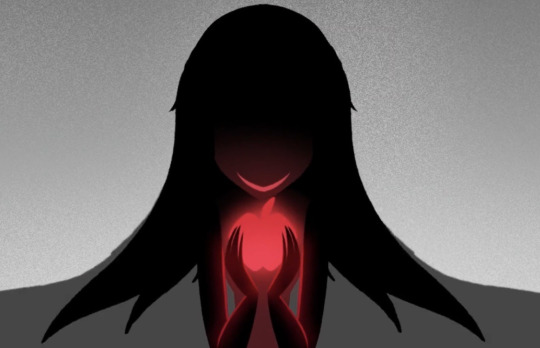
However, Charlie also notes that it was through the 'gift' of free will that the "root of all evil" entered the world, for if mankind could choose to be good, then they could also choose to be evil ('malus').
John Milton states in Paradise Lost: "Of Man's First Disobedience, and the Fruit Of that Forbidden Tree [malus], whose mortal taste Brought Death (evil, malus) into the World, and all our woe."
Thus, the use of an apple specifically is likely a tie-in to what others have been speculating about a character that series creator Vivienne Medrano (Vivziepop) alluded to a while back: "The Root of All Evil".
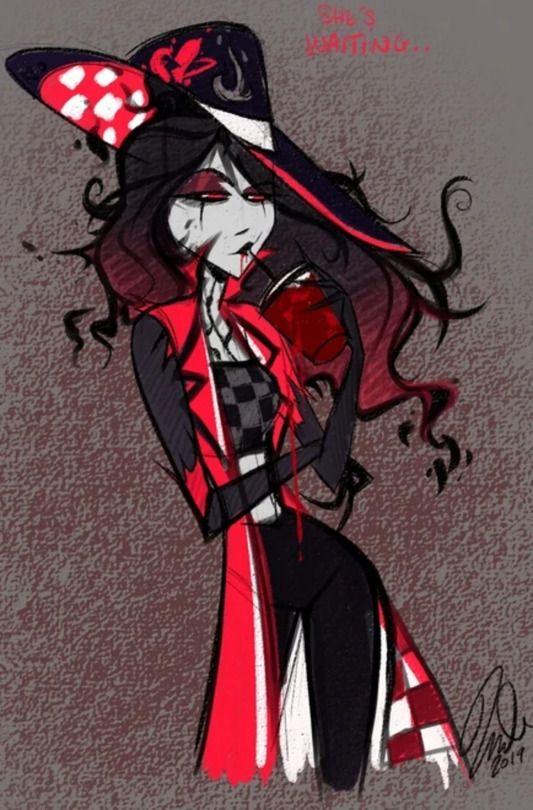
However, "Roo" itself is depicted as possessing the body of a human woman, presumably Eve, the first one to eat the "fruit of knowledge":
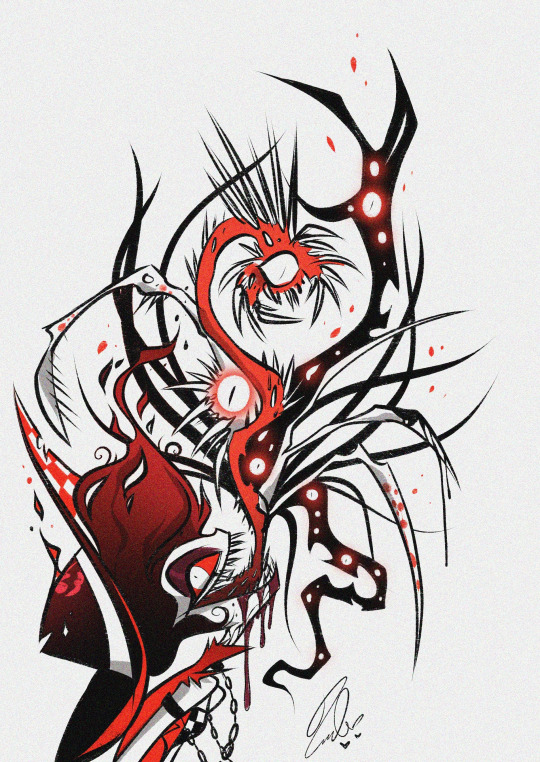
Thus, we can discern that "Malus" likely refers to this character. (Also see: "Maleficent", a name that also uses the root word "mal", "evil".) As for Roo's intentions, if Charlie is "good" - and, if, in fact, Alastor was sent by "Roo" (Eve) - then they may want for Alastor to work on their behalf to "corrupt" Charlie, or make sure the hotel never succeeds.
This is because demonic power is tied to human souls, and there are "millions of souls" in Hell, which likely fuels the great power of "Roo". The more souls there are in Hell, the more powerful "Roo" becomes. The Overlords also get their demonic power from "millions of souls".

The deal between Eve and "Roo" might even be the first contract, or deal, between a human soul and a demonic entity; in exchange for 'free will', and the knowledge of good and evil, Eve allowed the "Root of All Evil" to inhabit her body, and to escape the void or prison it was confined to by Heaven (Hell?). (For one cannot be 'all-good' unless you attempt to 'eliminate' or 'ablate' evil; and, in Greek mythology, Zeus imprisoned the Titans in Tartarus for all of their evil deeds.)
Another possibility, brought up in an article by Gillian Osborne, is that Lucifer sees the "fruit of knowledge" as an apple, but it may appear as different fruits to different people, depending on how they view it. This also fits with Lucifer and angels being able to easily shapeshift.
In Paradise Lost, only Lucifer describes the fruit as an "apple" (malus), as he associates malus with "bad, evil", while the narrator also describes the fruit as "a mix of different colors" and peach-like. This then begs the question: "Did the fruit of knowledge of good and evil become 'evil' because Eve harbored resentment towards Adam?"
Quote: "Lucifer (Satan) gives Eve yet another hint that this tree may be more complicated than he wishes her to believe: although elsewhere in Milton's poem Eden is heady with its own newness, sprouting spring flowers left and right, the tree of knowledge is already old: its trunk is 'mossie'. Nevertheless, Lucifer claims to wind himself around the tree 'soon'; the quickness of his reported arrival stands in contrast to the timescales required to cover a fruit tree with moss (PL 9.589). Placing Lucifer's winding body between these two timescales—an easeful present and the inhuman scale of natural history—Milton suggests that there is something dangerous in entangling the past with the present. Yet, 'Paradise Lost' also makes deep biblical history feel like present politics for its readers. When Adam and Eve wander out of Eden at the end of the poem, they famously make their way not only into an earthly paradise, but also into the present. Eden's mossy apple tree therefore represents the pitfalls of conflating nature and history, of seeing any action in human history—even Eve's eating of an apple—as natural, if by nature, we mean inevitability. For Milton, history, unlike nature, is directed by humans, progressive, and, like the reading of 'Paradise Lost', hard work. While trees may inevitably collect moss the longer they live, Adam and Eve's labors in the garden, and our labors of reading, require agency and effort. Milton's poem refuses mourning the loss of Eden, [and the perfection of Heaven], in favor of a perpetual, melancholic, recreation of paradise: a present perfecting."
To quote Twisted: The Untold Story of a Royal Vizier, which also draws inspiration from John Milton's Paradise Lost: "It's an unfortunate situation...but you do have a choice [i.e. free will]."
#hazbin hotel#hazbin hotel analysis#hazbin#hazbin analysis#hazbin hotel meta#hazbin meta#hazbin hotel theory#hazbin theory#deep thoughts#john milton#paradise lost#eve hazbin hotel#lucifer hazbin hotel#lucifer morningstar#adam hazbin hotel#lilith hazbin hotel#lilith morningstar#roo hazbin hotel#root of all evil
201 notes
·
View notes
Text











i am what you made me: unlovable
LETTER TO HIS FATHER (1919, franz kafka)
FRANKENSTEIN (1818, mary shelley)
GREAT EXPECTATIONS (1860, charles dickens)
DEXTER (2008, "our father", dir. keith gordon)
ELEKTRA (420-414 BC, sophocles)
THE LAST DAYS OF JUDAS ISCARIOT (2005, stephen adly guirgis)
PARADISE LOST (1667, john milton)
SHARP OBJECTS (2006, gillian flynn)
#web weaving#comparatives#parallels#parallel post#frankenstein#dexter#sharp objects#dexter morgan#mary shelley#great expectations#charles dickens#elektra#sophocles#paradise lost#the last days of judas iscariot#franz kafka#letter to his father#dexter showtime#gillian flynn#john milton
2K notes
·
View notes
Text
WHO IS CROWLEY AFTER THE FALL?
so there is a LOT of debate over who Crowley was before The Fall. I have seen a lot of headcanons going around the place saying he was Raphael or Kokabiel or Baraqiel.
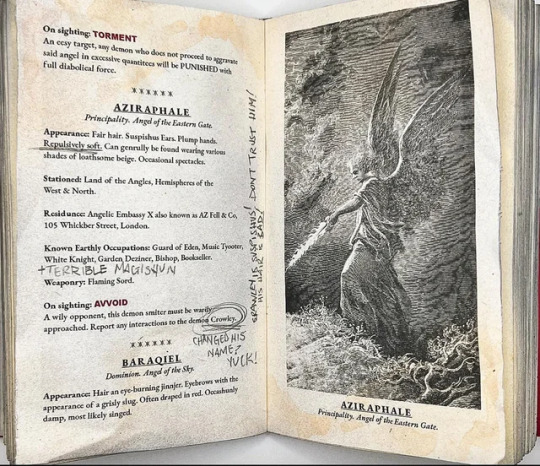
I mean this is the Exhibit A for saying that Crowley is Baraqiel. I think NOT.
Because this is a handbook written by demons for demons. The title is literally (if my memory serves me right) a guide to angelic beings that walk the earth. SO Crowley is not That..
Other than the red hair thing, no other physical characteristic matches. This Baraqiel guy sounds like an absolute gremlin. grisly slug, occasionally damp. NOT CROWLEY. I mean she's the most dashing thing around.
NO. #3 It says CROWLEY one line above the name Baraqiel. If Crowley is Baraqiel then why would his demon name appear right under that?????
And I think somewhere Neil Gaiman refuted this theory (I'm not really sure but I think so plz don't come at me with pitchforks if I got it wrong). So.......
But this is all beside the point. What I'm trying to say is that too much has been said about who Crowley was before he fell. There is very little, if not none, that has been said about who he was After.
Some say that he's an insignificant demon or some loser guy in Hell or whatever the equivalent of an angel principality deputy on Earth is.
I BEG TO DIFFER.
He is Important. Just look at the kind of assignments he's given. Original Sin, Major Historical Temptations and Evil Acts, Delivering the Antichrist and bringing about Armageddidn't.
But who is he exactly??????????
So canonically we're never told what Crowley's rank in Hell is. But there are more that enough hints for us to figure that out for ourselves.
But where does one place him when the hierarchy is so complex and varying across different historical and theological sources.
Such as here:
I have been thinking about this and I have two current theories
Crowley is Astaroth
Crowley is The Leviathan
I'll discuss only one in this post. I'll save the other for the next post.
Now book!Omens clearly tells us that Crowley or Crawley is not his real demonic name. For those who haven't read the book this happens when Hastur Lavista and Ligur come to hand over the antichrist to Crowley in the churchyard and as he's about to sign his name as "Crowley" they tell him to sign his real demonic name.
Are you with me?!!!!!
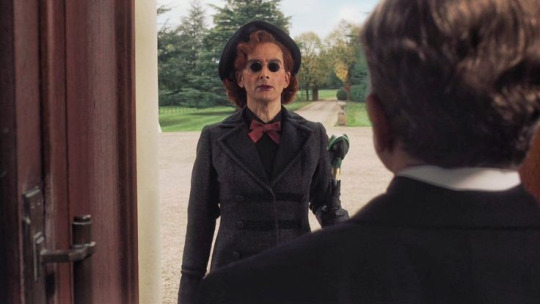
NANNY ASHTORETH!
Why did she use this particular name for her nanny disguise. What if...... what if this IS her real demon name.
A lot of my real life friends are annoyed beyond measure by my constant ranting about etymologies, origin and construction of discourse and epistemology, especially when it comes to presenting my thesis over how all Abrahamic religions and their symbology and iconography is, how do I put it, inspired from pagan religions that they expunged. I mean the concept of angles, the man shaped being with wings that is actually just a ball of fire or eyes or hale discs or sth is a pagan Persian concept.
Back to the matter at hand.
Ashtoreth, Astaroth, Astarte, Ishtar, are all the same name in different dialects and languages. All of these refer to a certain Babylonian goddess. When the People of God probably cleansed off all the infidels they decided to literally demonize their god and name a demon after her. In Milton's Paradise Lost Astaroth is one of the three princes or Grand Dukes of Hell alongside Beelz and Lucifer. If this theory might be true Crowley is a Prince/Grand Duke of Hell.
Now this gets even more interesting. Ashtoreth, Astarte, whatever you may, is a goddess of fertility and is associated with childcare. I mean at this point I just stopped to marvel at the attention to detail that Mr. Gaiman's work hold, the smallest hidden meanings in the storytelling.
Another thing. The Babylonians built these temples called ziggurats to worship Astarte and they looked something like this
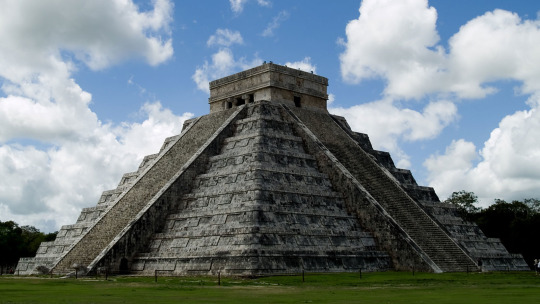
and this
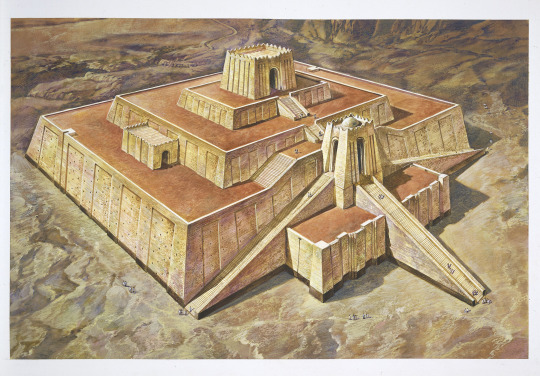
they were also known as sky temples.
Because Astaroth was first and foremost the goddess of stars and the Babylonians were stargazers and the temples were constructed as a stairway to heaven to take them closer to the stars and functioned as an observatory at times.
I'm just imagining Crowley turning up in ancient Babylon and with her other-worldly looks, knowledge of the stars and compassion for children they just..... started to worship her.
Before the Christians came and declared them pagans and the rest is history.
Continued in next post for the second theory......
#good omens#crowley#nanny ashtoreth#nanny crowley#neil gaiman#ineffable husbands#good omens season 2#good omens meta#good omens brainrot#paradise lost#john milton#christianity#Babylon#history#religious iconology#meena rants#witers on tumblr#azicrow#aziraphale x crowley#go s2#go season 2#give me season 3 or give me death#bible fanfiction#leviathan#demons#angels#Astarte#Ashtoreth#Ishtar#etymology
196 notes
·
View notes
Text
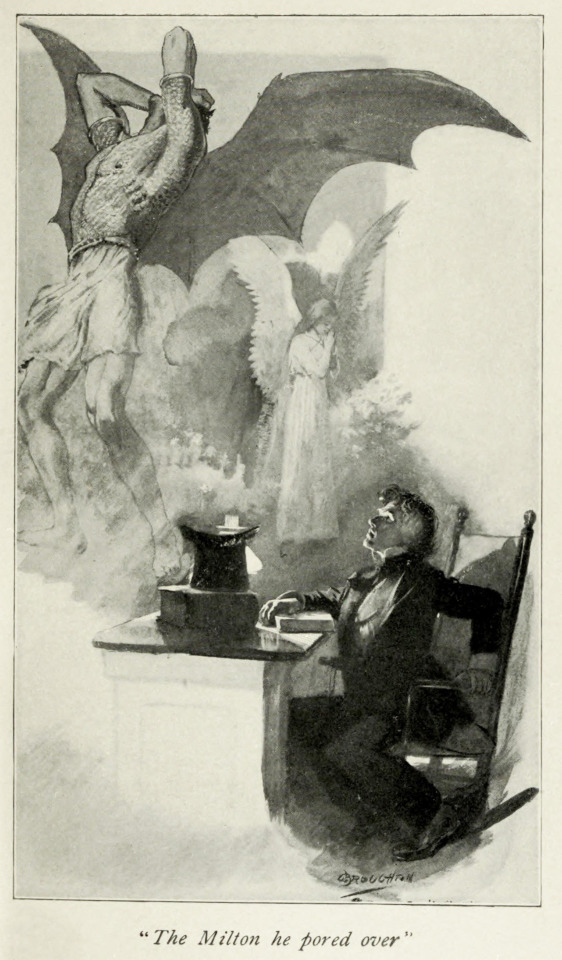
George Henry Boughton (1833-1905), ''Understudies'' by Mary Eleanor Wilkins Freeman, 1901
Source
#George Henry Boughton#George H. Boughton#american artists#Mary Eleanor Wilkins Freeman#john milton#Lucifer#satan#vintage illustration#vintage art#paradise lost
246 notes
·
View notes
Text
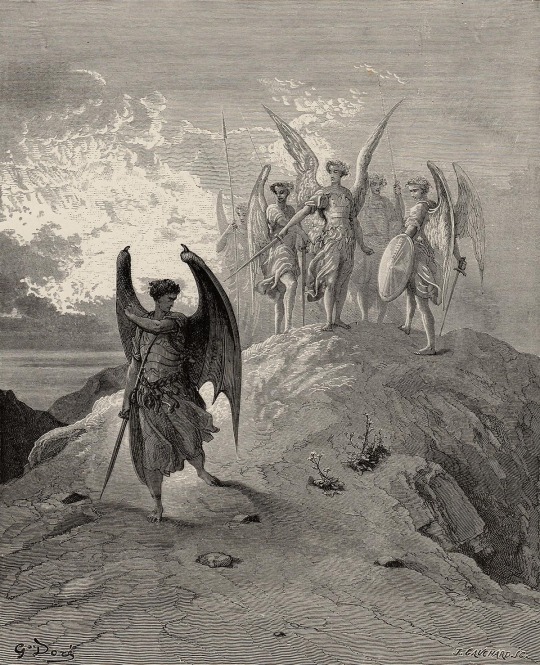
Gabriel and Satan by Gustave Doré
#gabriel#satan#lucifer#angels#gustave doré#art#paradise lost#john milton#angel#religious art#religion#religious#christianity#christian#fallen#fallen angel#earth#war#battle#god#vanquished#romanticism#romantic#seraphim#seraph#archangel#archangels
2K notes
·
View notes
Photo

John Milton, Paradise Lost, Book 1
[originally published 1667]
#john milton#literature#words#paradise lost#quotes#academia#dark academia#quote#lit#books#books and libraries#reading#quote of the day#bookworm#book quotes#prose#booklr#bibliophile#excerpt
620 notes
·
View notes